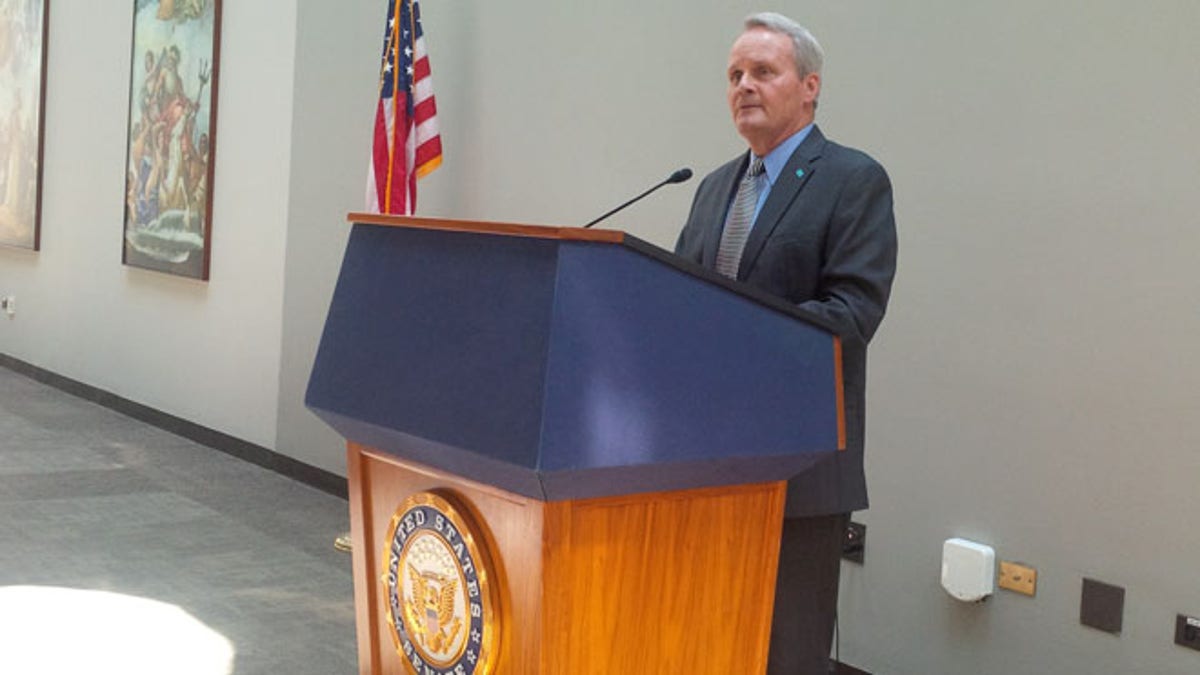
July 22, 2015: Foundation for Economic Education President Larry Reed on Capitol Hill talking to interns about 'liberal bias' myths on campus. (FOXNEWS.COM)
A new wave of progressivism and political correctness in U.S. schools -- highlighted by “trigger warnings” and “safe zones” -- has conservative groups fighting back on campuses across the country, saying “students need to get both sides of the story.”
The Young America's Foundation and the Foundation for Economic Education co-published and released a book last week titled “Excuse Me, Professor: Challenging the Myths of Progressivism.” It is among the most recent efforts to shed light on what the groups consider liberal bias in U.S. colleges and high schools.
“Professors are teaching bias disguised as fact,” YAF spokeswoman Emily Jashinsky said ahead the 37th annual National Conservative Student Conference, starting Monday at George Washington University. “College campuses are insulated bubbles for far-left ideology.”
Jashinsky said her group and others like it are just trying to make students aware of an opposing point of view.
YAF, whose roots trace back to conservative movement icons such as William F. Buckley Jr., was formed in the 1960s and now has roughly 200 chapters in colleges and high schools across the country.
This year’s conference and other activities, including Foundation for Economic Education President Larry Reed’s speech Wednesday to Capitol Hill interns, indeed come amid a reemergence of progressivism and political correctness on campuses.
“After political correctness burst onto the scene in the late ‘80s and early ‘90s, it went into long remission. Now it has returned,” wrote Johnatan Chait in his 4,712-word essay “Not a Very P.C. Thing to Say" in the Jan. 27 issue of New York magazine.
Among the most controversial elements of the trend are the trigger warnings and safe zones.
Trigger warnings are notices that an event or a piece of writing -- including literary classics -- could trigger a traumatic memory or episode.
Student governments in schools such as Oberlin College and the University of California, Santa Barbara have asked that such warnings be included on syllabi and other class material.
And such books as F. Scott Fitzgerald’s “The Great Gatsby” and Shakespeare’s “The Merchant of Venice” reportedly have been targeted.
The safe zones or safe places are areas to which students can retreat during a debate on, for example, sexual contact on campus or other sensitive topics.
“It’s a really sad trend -- students isolating themselves from opposing viewpoints,” Jashinsky said.
Reed, who co-authored and edited “Excuse Me Professor,” a collection of essays he wrote in past years, urged the roughly two dozen Capitol Hill interns to “be thoughtful in your thinking.”
He went through the key progressive arguments that his book attempts to dispel including “Profit is evidence of suspicious behavior” and “Income inequality arises from market forces and requires government intervention.”
Reed attempted to use easy, relatable examples such as people tending to spend money given to them more freely than money that they have earned. He argued an employee on a business trip might not order lobster for dinner if he or she is paying for it.
“The world is dying today for people of good character,” he said in conclusion and after a brief talk by 2016 GOP presidential candidate and Kentucky Sen. Rand Paul, a strong less-government advocate.
Paul talked about the importance of think tanks like FEE helping shape public policy and about how his father -- Libertarian, presidential candidate and retired Texas GOP Rep. Ron Paul -- was an early supporter of the group.
“And I’m a big fan,” Paul added.
Earlier in the week, Reed said, “There's a hunger out there among students for a response to the progressive agenda,” which he argued is having a “crushing effect” on freedom of speech.
“Students are walking on eggs shells saying, ‘Can I say this; Can I read that?’” he continued.
The groups’ tax-exempt status doesn’t allow them to get involved in political campaigning and electoral politics.
However, Reed said his observation is the progressive agenda being touted by surging Democratic 2016 candidate Vermont Sen. Bernie Sanders, Independent, is “bumper sticker progressivism.”
“Sanders looks the part, but (the platform) is old, a throwback from yesteryears,” he said.
YAF, which also preserves President Reagan’s Santa Barbara, Calif., ranch, puts out Webinars on liberal-bias issues and expects about 15,000 students to attend next week’s event in Washington.
Jashinsky says the group is more focused on the long-term than next year’s elections.
“We’re more than just a surge election,” she said. “We’re concerned about the hearts and minds of future generations.”




